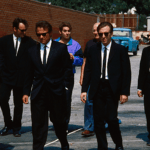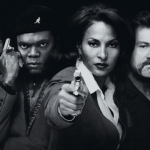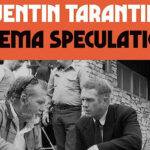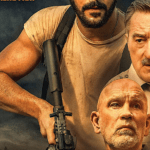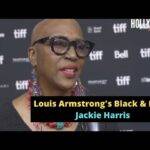Table of Contents
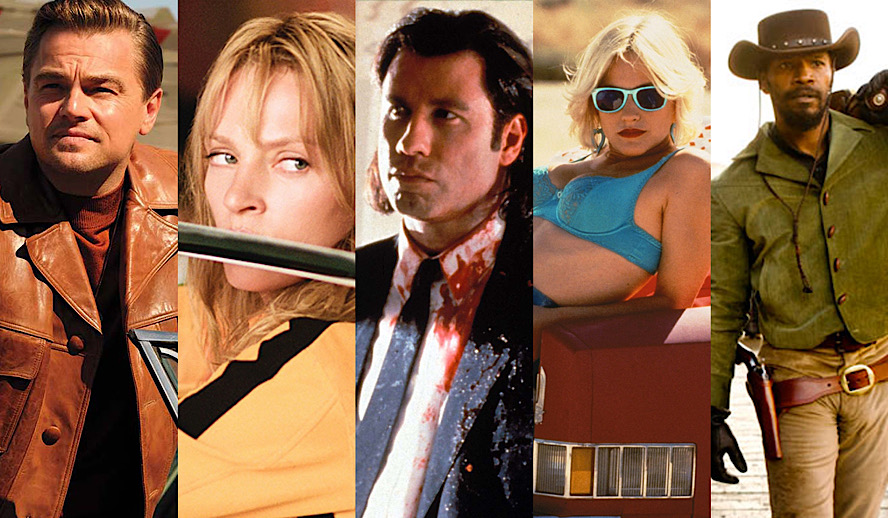
Photo: Quentin Tarantino Movies
I like Quentin Tarantino, though I don’t love him. All of his films are good, and even the worst ones are great exercises in entertainment, and/or possess some exceptional quality. At his best, Tarantino makes you marvel at the skill of his dialogue and his ability to stage set pieces alongside a compelling story. Most of the time though, these qualities only present themselves sporadically. Still, even his most uneven films are enjoyable. He lets his personality and passion shine through his work both to our benefit and detriment. He undoubtedly has a personal style, but that self-indulgence also lets down good films that could be great, like Django Unchained and Inglorious Basterds. No matter how good the film, Tarantino will insert bare feet, gratuitous violence, vinyl CDs, and the n-word. Still, some of these tendencies are occasionally effective (not the foot fetish though).
Related article: FACT-CHECKED Series: 32 Facts on Hollywood Legend Quentin Tarantino
The violence he loves showing is powerful when it isn’t too over the top, which is the case in Reservoir Dogs and Pulp Fiction. Similarly, though his preoccupation with the n-word is uncomfortable, it makes his characters flawed in a way that is often dramatically effective. It is also worth noting that Tarantino has undeniably showcased black people in a more nuanced light than most of his white peers. Samuel L Jackson is always best served by Tarantino’s writing, and Jackie Brown (Pam Grier) is a great character. In fact, Brown is also proof that Tarantino often also writes very well for women, despite his occasional leeriness. In all of his films, he makes an attempt to discuss race. Though uncomfortable, his preoccupation with the subject is, I think, well-intentioned. Tarantino loves being provocative. It’s why we love him and it’s why we are occasionally irritated by him. He has made some very entertaining, culturally defining films and some other mixed efforts. I shall rank them here. This is solely my personal opinion on his films.
Quentin Tarantino Movies Ranked
#10 Death Proof (2007)
Death Proof stars Kurt Russell as Stuntman Mike, a stuntman (you guessed it) who picks up women to murder them. It is greasy and sleazy in an amusing but ultimately irritating manner. Some will like its brashness, some will not. Death Proof seems to exist solely for the purpose of promoting grindhouse, which is an incredibly narrow aim. It is hard to criticise it too meticulously because its ambitions are clearly low- Tarantino’s having fun making a silly murder film that is deliberately much sillier than his other silly murder films. The witty dialogue seems wasted on the stupidity of the material, and the characters are incredibly empty. Also, it is essentially the same story twice, which is an irritating structure once you realise where it is going. Taken for what it is, it is a bit of silly fun, but it is also comfortably Tarantino’s worst film. It is more interesting as a distillation of his stylistic tendencies than anything else, particularly the gleefully punk inappropriateness often present in his work. It is, however, nice to see Russell in a villainous, comically evil role, and the final car chase is a brilliant showcase of Zoe Bell’s stunts. Still, this one is strictly for Tarantino completists and grindhouse geeks.
Subscribe to Hollywood Insider’s YouTube Channel, by clicking here.
#9 The Hateful Eight (2015)
The Hateful Eight is a sporadically entertaining throwback western, starring Samuel L Jackson as a lone ranger who walks into a whodunnit situation. This leads him to a Haberdashery which (you guessed it, again) soon becomes home to violence. The Hateful Eight has some good tension- the claustrophobic setting allows for Tarantino’s dialogue centric style to flourish. Samuel L Jackson is good, of course, and the conclusion is typically bloody. It is nice to hear Ennio Morricone (The Good The Bad, The Ugly) score a Tarantino film, which was inevitable at some point. However, though it boasts some great elements, like the worst Tarantino films The Hateful Eight doesn’t really amount to a story worth telling and is far too long for the simple premise it presents.
#8 Kill Bill Volume 1 (2003)
In Kill Bill: Volume 1, The Bride (Uma Thurman) sets out on her quest to kill Bill (David Carradine), which must begin with the murder of his associates. Kill Bill Vol.1 has the gleeful abandon of Death Proof but with better dialogue, actors, and set pieces. Uma Thurman is a likable lead, and the mystery surrounding Bill is somewhat interesting. There are some great fight scenes leading to a fantastically bloody and memorable showdown. It is very stylish – The Bride’s yellow outfit is iconic. Tarantino’s foot fetish even has a place in the storyline. However, though Kill Bill is occasionally fun it isn’t emotionally engaging, nor are there many memorable moments (save for the aforementioned showdown) or characters, which is the difference between it and Tarantino’s better works. The story is incredibly thin- the terms of the revenge plot are barely discussed which makes it difficult to be invested in the situation. Like John Wick, you forget the point of the revenge through all the collateral damage, and the story becomes emotionally unfocused as a result. The film is stylish, but its preoccupation with being cool is its downfall, as is often the case with Tarantino.
Related article: The Power of Positivity: Ikorodu Bois + Chris Hemsworth + Russo Brothers + Sam Hargrave
Limited Time Offer – FREE Subscription to Hollywood Insider – Click here to read more on Hollywood Insider’s vision, values and mission statement here – Media has the responsibility to better our world – Hollywood Insider fully focuses on substance and meaningful entertainment, against gossip and scandal, by combining entertainment, education, and philanthropy.
#7 Kill Bill Vol 2 (2004)
In Kill Bill: Volume 2, the Bride completes her revenge. Kill Bill Vol 2 is so similar to Vol 1 that I see why Tarantino lumps them together. It has similarly enjoyable fight scenes and shares the same style-over-substance aesthetic. The only reason I prefer it is because the final, brilliantly written confrontation with Bill is surprisingly touching, and Bill is the first villainous figure who actually feels like a character (though this may be attributed to David Carradine’s excellent performance). Also, there’s more Michael Madsen, and more Michael Madsen is always a good thing.
#6 Django Unchained (2012)
Django Unchained is a revenge tale (again) about a freed, former slave named Django (Jamie Foxx) who teams up with Dr. Schultz (Christoph Waltz) to free his wife from the evil Calvin Candie (Leonardo DiCaprio). Django has a fantastic blend of comedy and violence, and mostly manages to do honour to the subject matter, even though there is something obnoxious about Tarantino’s need to take on the subject of slavery without compromising his style one iota. Still, the set pieces are tense and entertaining as ever; the dinner scene in Candieland is brilliant and the violence is incredibly fun. Samuel L Jackson is fantastic in an uncharacteristically sneaky role. There is however an inherent problem in that Tarantino’s exploitative style is hard to take seriously. Therefore, given the serious subject matter, the story’s lack of earnestness is more of a problem than it otherwise would be. I think Inglorious Basterds succeeds more in finding a balance between seriousness and comedy within its dark historical period. Tarantino is never good in his cameos, but his appearance in Django Unchained is genuinely distracting and seems to signal the worst to come. From this point onwards the last act peters out and the showdown is bloated and overdrawn. On its own it is entertaining, but within the context of the story, you have stopped caring once the 5000th bullet is taken. Still, for the first two hours, Django Unchained is fantastically entertaining.
Related article: Hollywood Insider’s CEO Pritan Ambroase: “The Importance of Venice Film Festival as the Protector of Cinema”
Related article: The Masters of Cinema Archives: Hollywood Insider Pays Tribute to ‘La Vie En Rose’, Exclusive Interview with Director Olivier Dahan
#5 Jackie Brown (1997)
In Tarantino’s first film to be taken entirely from source material (though some may dispute this), Jackie Brown (Pam Grier) is caught between the police, her sociopathic colleague Ordell (Samuel L Jackson), and bond salesman Max Cherry (Robert Forster). When I saw Jackie Brown for the first time, I was underwhelmed- I don’t really know why. Perhaps I was surprised by the slow character development and a more grounded tone. For those wanting the explosiveness, Tarantino is known for, Jackie Brown does not offer this. It does however exceed most of his films in its characterisation. Ordell is a brilliant villain and a testament to Jackson’s defense of Tarantino’s alleged racism. Ordell is often the smartest man in the room- he is magnetic, nuanced, and frightening. Pam Grier, who is referenced in Reservoir Dogs, is thoroughly likable and well-written. Both Jackie Brown and Ordell’s characterizations show that though Tarantino’s preoccupation with race is occasionally uncomfortable, he is more adept at showing black people to be three-dimensional human beings than most white directors on his level. Robert De Niro and Robert Forster also give nuanced, quiet performances. Jackie Brown has a more heartfelt story than what you would expect from its director. It has a great romance and a welcome sense of subtlety. Though the source material wasn’t written by Tarantino his touch is clear in the incredible dialogue throughout. The reason it isn’t higher is because the central storyline is occasionally languid, even though the characters are compelling.
Related article: Every Christopher Nolan Film Ranked from Good to Best, Director of the Most-Anticipated Film ‘Tenet’
Related article: Patty Jenkins is the Real Wonder Woman: The Master Director’s Journey
#4 Once Upon A Time In Hollywood (2019)
Set during the twilight of Hollywood’s Golden Age, Once Upon A Time In Hollywood charts two crucial episodes in the lives of Rick Dalton (Leonardo DiCaprio) and Cliff Booth (Brad Pitt). The film is slow but in a good way. Spending trivial time with the characters is fun because they are good company, and the period detail is absolutely astonishing. You sometimes forget that you are in a Tarantino movie- it really just seems like 1960s LA. I acknowledge that the film is somewhat meandering, but it meanders in a consistently engaging and entertaining manner. It is a great watch for film fans and feels like a film Tarantino needed to make- all the references apparent in his other films (Sergio Leone, for one) are acknowledged more forthrightly here. It feels like a genuinely heartfelt tribute to cinema. The looming reality of the Tate murders is also dealt with brilliantly, in a tense and surprisingly moving ending. A knowledge of those murders is probably necessary to feel the film’s underlying tension, but if you have it, the climax is one of Tarantino’s best.
Related article: Video: Quentin Tarantino Cameo Hidden in Poster of ‘Once Upon A Time In Hollywood’?
#3 Inglorious Basterds (2009)
In Inglorious Basterds, both the titular Basterds and Shoshanna are out for revenge- against the Nazis.
Inglorious Basterds boasts one of the tensest opening scenes of all time and another incredibly executed bar scene later on. Tarantino’s films all boast brilliant set pieces, but Inglorious might contain his most expertly crafted sequences of dialogue-led tension to date. The dialogue is helped by the great use of language. Unlike many American films set in Europe, it is mostly European (French, German, even Italian), which really enhances the power of the words and overall believability. Brad Pitt is amusing as murderous Basterd leader Aldo Raine. His opening monologue is darkly comic and the “Arrivederci” moment always makes me laugh. The best performance however is by Christoph Waltz, who is incredibly menacing as the politely sinister, trilingual Jew-Hunter Hans Lauda (Waltz picked up a deserved Oscar for both this and Django Unchained). Tarantino’s obvious passion for film is well interwoven into the plot. It is also nice to see him operate in a totally different setting (away from America), as it helps differentiate Inglorious from his other films. The film is also unbelievably brutal and its violence mostly achieves a strange balance between perverse enjoyability and discomfort.
Inglorious is worse than the big two for a few reasons. Like a lot of Tarantino’s work, it is messy and tonally mixed. The film never decides if it is about Shoshanna or the Basterds, or whether it wants to be a comedy or a drama. The conclusion somewhat undermines the intelligence of Lauda’s character, and I don’t love the end of Shoshanna’s storyline. Inglorious Basterds improves upon Tarantino’s strengths in many ways but much like Django, its inconsistency is what holds it back in relation to the next two films. Still, it is a sporadically excellent film.
Related article: A Tribute to Oliver Stone: The Oscar-Winning Hollywood Director & Writer
Related article: A Tribute to Great International Film Directors & Their Films
#2 Reservoir Dogs (1992)
Tarantino’s debut is a violent, explosive caper charting the aftermath of a heist (which is never shown) gone wrong. It has a very simple premise, and simplicity suits Tarantino’s outspoken style. Where you get exhausted by the endless sequences of dialogue ending in violence in most of his longer films, here you don’t. It is also easy to forget how violent Reservoir Dogs is given the carnage of Tarantino’s subsequent films, but it is brutal and in a dramatically effective way. The lack of cartoonish splatter is welcome- Michael Madsen’s antics as Mr. Blonde are genuinely disturbing. The conflict within the group actually has some emotional resonance, especially between Mr. Orange (Tim Roth) and Mr. White (Harvey Keitel). (also, both Roth and Keitel are excellent). The characters are savage, racist, and mostly unlikeable. Following them is slightly uncomfortable, but they feel real. They have conversations that people actually have, even though most films don’t like to admit it. Tarantino is always comfortable exposing the nastiness of human beings in a way that is confronting, and it works here. I do think that the intertwining chapters sometimes detract from the tension of the core situation, (a feature Tarantino handles much better in my number one pick), but Reservoir Dogs is cool, simple, and satisfyingly brutal.
Related article: Powerful Director-Actor Partnerships: A Look at the Greatest Cinematic Duos
Related article: The 3 Best Spike Lee Films From The Director’s Filmography
#1 Pulp Fiction (1994)
Pulp Fiction, Tarantino’s epic intertwining tale of crime in LA, is his greatest film. It shows the best side of all of his qualities. His soundtracks are usually good, but Pulp Fiction’s is the best. His dialogue is often great, but Pulp Fiction’s is the most memorable. His violence often inspires an uncomfortable mixture of perverse enjoyment and horror, and this mixture is more effective than ever in Pulp Fiction’s famous “gimp” scene. The characters are engaging as well as visually iconic (the black suit and tie combo is immortal). Samuel L Jackson gives perhaps his finest ever performance (though Jackie Brown and Django Unchained are almost as good). Almost every scene contains a moment, lined, or musical queue that is now etched into public consciousness. The interweaving narrative is seamless, and greatly improves upon its promise in Reservoir Dogs. This feels like Tarantino’s most expertly crafted story- everything pieces together and feels necessary to the conclusion. Pulp Fiction is so much fun and it has believable, real characters and situations. It is rare that Tarantino’s many qualities combine consistently, but they do it most fruitfully in Pulp Fiction – and that’s why it’s his best.
Click here to read Hollywood Insider’s CEO Pritan Ambroase’s love letter to Black Lives Matter, in which he tackles more than just police reform, press freedom and more – click here.
An excerpt from the love letter: Hollywood Insider’s CEO/editor-in-chief Pritan Ambroase affirms, “Hollywood Insider fully supports the much-needed Black Lives Matter movement. We are actively, physically and digitally a part of this global movement. We will continue reporting on this major issue of police brutality and legal murders of Black people to hold the system accountable. We will continue reporting on this major issue with kindness and respect to all Black people, as each and every one of them are seen and heard. Just a reminder, that the Black Lives Matter movement is about more than just police brutality and extends into banking, housing, education, medical, infrastructure, etc. We have the space and time for all your stories. We believe in peaceful/non-violent protests and I would like to request the rest of media to focus on 95% of the protests that are peaceful and working effectively with positive changes happening daily. Media has a responsibility to better the world and Hollywood Insider will continue to do so.”
Vote with a conscience – Register to Vote – Your vote saves lives and ends systemic racism
Ways to support Black Lives Matter Movement to end systemic racism
More Interesting Stories From Hollywood Insider
– Want GUARANTEED SUCCESS? Remove these ten words from your vocabulary| Transform your life INSTANTLY
– Compilation: All James Bond 007 Opening Sequences From 1962 Sean Connery to Daniel Craig
– Do you know the hidden messages in ‘Call Me By Your Name’? Find out behind the scenes facts in the full commentary and In-depth analysis of the cinematic masterpiece
– A Tribute To The Academy Awards: All Best Actor/Actress Speeches From The Beginning Of Oscars 1929-2019 | From Rami Malek, Leonardo DiCaprio To Denzel Washington, Halle Berry & Beyond | From Olivia Colman, Meryl Streep To Bette Davis & Beyond
– In the 32nd Year Of His Career, Keanu Reeves’ Face Continues To Reign After Launching Movies Earning Over $4.3 Billion In Total – “John Wick”, “Toy Story 4”, “Matrix”, And Many More
Quentin Tarantino movies, Quentin Tarantino movies, Quentin Tarantino movies, Quentin Tarantino movies, Quentin Tarantino movies, Quentin Tarantino movies, Quentin Tarantino movies, Quentin Tarantino movies, Quentin Tarantino movies, Quentin Tarantino movies, Quentin Tarantino movies, Quentin Tarantino movies, Quentin Tarantino movies, Quentin Tarantino movies, Quentin Tarantino movies, Quentin Tarantino movies, Quentin Tarantino movies, Quentin Tarantino movies, Quentin Tarantino movies, Quentin Tarantino movies, Quentin Tarantino movies, Quentin Tarantino movies, Quentin Tarantino movies, Quentin Tarantino movies, Quentin Tarantino movies, Quentin Tarantino movies, Quentin Tarantino movies, Quentin Tarantino movies, Quentin Tarantino movies, Quentin Tarantino movies

Amhara Chamberlayne is a graduate in English Literature from Warwick University who shares Hollywood Insider’s passion for cinema. When he is not watching films he is writing about them. Uninterested in gossip and agenda, Amhara instead believes in sharing his honest individual reaction to cinema. He enjoys the multi-variant reactions films elicit and believes his take is just as valid as others. For Amhara, the joy lies in the exchange of opinions.

